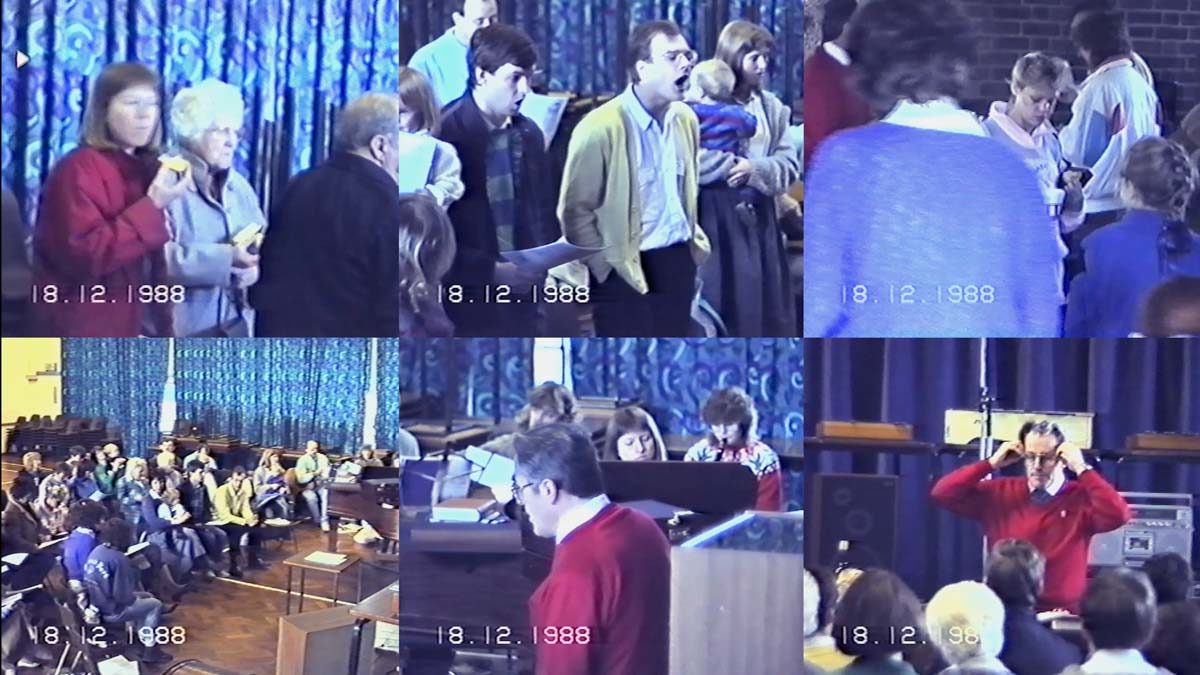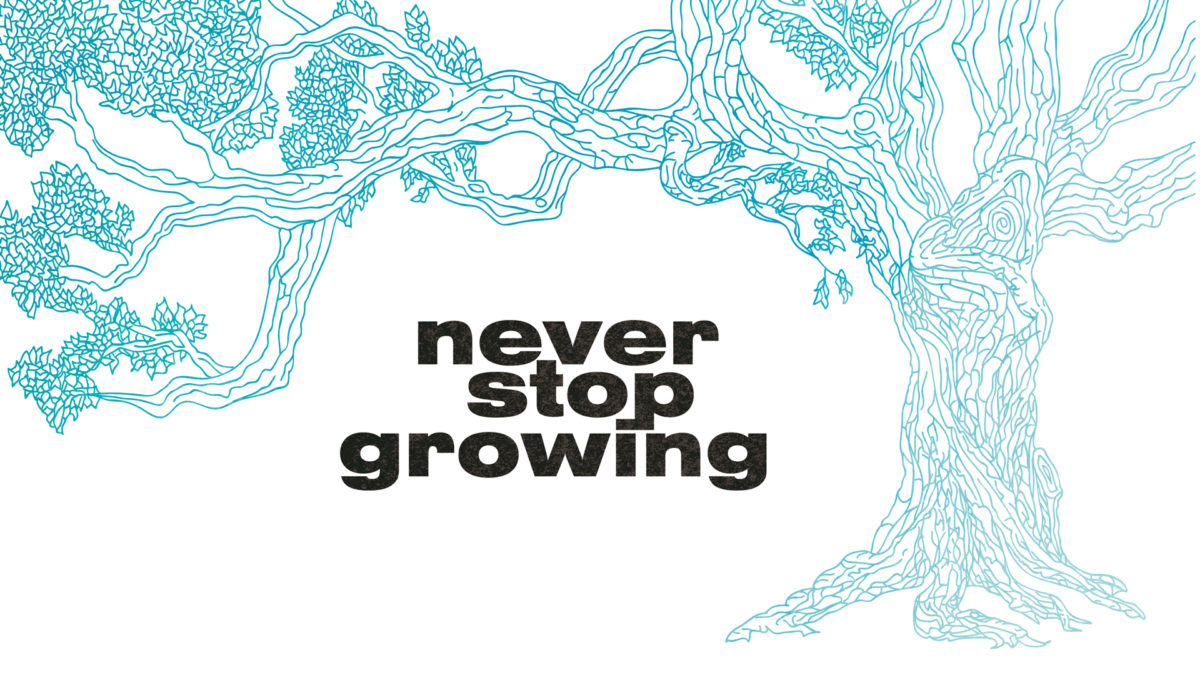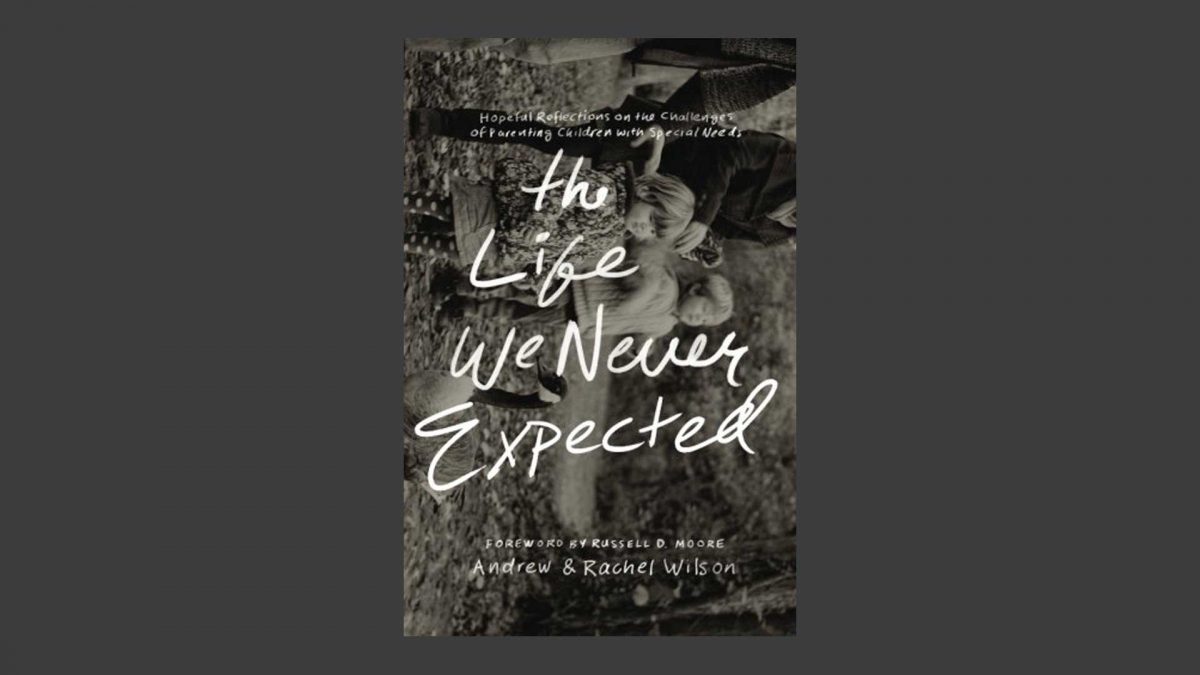Reaching young people is amazing. 2018 marks thirty years since Kings was planted. In this time a whole generation of kids and young people have grown up amongst us, left home and are influencing the world around them. In this collage we’ve captured a small snapshot of the first generation that has grown up at Kings.
Category: Articles
Born in the 80s, changing the future!
Before the iPhone, SnapChat or the internet, there was Kings! Planted in the 80s, in the age of the Rubix Cube, Ceefax and the Commodore 64, Kings Church began in Old Town, in a house, with just eighteen people.
On 4th September 1988 we had our first meeting in Ratton School. We’ve since planted two new venues and in October 2017 we celebrated twenty years since we had our very first Sunday meeting at the Kings Centre.
Read More

↑ First meetings in Ratton School, 1988
Back then just 170 adults gave enough money to purchase the Kings Centre for £570,000. Even though we raised the money there were many obstacles to overcome, it was a roller coaster ride and against all the odds. But God came through and we secured the building.
We rattled around in this massive tin shack and set about converting an old carpet warehouse into something much more special. It was just the beginning!
Living downstream
We were driven by a vision. Our founding leader, Don, would regularly warn us that if we didn’t reach young people our church would die out within a generation.
We ran Evolution and brought the kids from the surrounding estates on double-decker buses. We ran Kids Klub and did ‘home visiting’. We ran Sports Klubs, Holiday Clubs and S.T.O.R.M. youth groups (‘Spiritual Teenagers On Radical Mission!’). All of this was week-in, week-out; slowly but surely seeing God work and transform lives. In this a whole host of young people have grown up at Kings, now in their twenties and thirties. Many have their own kids, are sold-out for Jesus and living lives where they’re making a difference in the world around them.
“we’re living downstream of the incredible generosity and vision of those that came before.”
We’ve seen amazing fruit over the last twenty years, and not just in the youth work. In fact, our whole church looks totally different. And while it’s involved the heart and soul of hundreds of amazing volunteers at Kings, over two decades (!), it was all made possible by the pioneers who purchased our first permanent base.
For the hundreds that have joined us since, we’re living downstream of the incredible generosity and vision of those that came before.

↑ 1990: Town Centre outreach and church picnic in Gildredge Park
Churches grow, visions grow
When we first moved into the Centre, it felt massive, and there was 40% of the building we didn’t think we would use. Ever. It’s amazing to think how much things have changed. Now every nook and cranny has been maxed out — the Centre has been a fantastic resource.
And yet we have an opportunity to do so much more with what we already have. With a thoughtful redesign and a change in the way we use the building, we could carve out a tool that will help us be much more effective in reaching Eastbourne.
Questions, questions
Over the last twenty years we’ve used Kings as a conference centre, hiring out the rooms and facilities. Last year it contributed £121,000 to our income as a church. But while it’s been amazing in this respect, a conference centre is never going to change the face of Eastbourne. In fact, we increasingly feel it’s now inhibiting our focus.
“We have a big vision: to reach families and eradicate loneliness…”
Questions have been asked: should we move? Should we build a bigger venue, or look for an extra one? When we sought God in this he never spoke about going somewhere else. Our leaders took some time out to go on a retreat in 2016 and felt God speak:
“All that you have is in the house. I gave you the building, it’s now time to start using it in line with the vision.”
We know that right now we are meant to remain at the Kings Centre and pursue the vision here.
Using the building in line with the vision
We have a big vision: to reach families and eradicate loneliness, to give every teenager a second chance and every unborn child the chance of life. It’s time to transform the Centre into a bespoke building tailored to the purposes of God.
The decision has been made: we’re downgrading the conference centre and building a family centre instead. We’ll be taking back the space we’re currently renting out and using it for the mission of the church. On paper it’s a big risk but we know the safest place to be is right at the centre of God’s will — whatever that looks like. But it will require two things from all of us: courage and devotion — the same spirit that marked us out in the early days.

It’s time to upgrade!
The redesign and re-purposing of the building also makes good sense. While the Centre might look okay on the surface, behind the scenes there’s a lot of restoration that needs taking place. Leaking roofs, broken boilers, holes in the sports hall floor… the list is extensive. Everything in the building is at least twenty years old and has come to the end of its life.
So why just reinvest in like for like? People love to upgrade their technology, their houses and cars; and often for good reasons. Families grow, needs change. Now we need to upgrade our building! This is a great time to change gears, re-imagine and go full throttle into the next two decades with a building fully equipped to serve our town and reach people with the good news of Jesus.
The plans for the redevelopment of Kings are currently underway. Watch this space for more information soon!
Never Stop Growing
It seems to be written into nature that when something stops growing it begins to die. But can it also be true of our Christian faith? How do we ensure that years and decades from now we are still strong in faith, still growing, still learning?
Jesus calls us to follow him 1. There’s a journey, there’s direction and there’s movement. Faith is active: we walk by the spirit 2, straining forward, pressing on towards the goal 3. To be unengaged or distracted does not leave us in a neutral zone — we are either walking towards Jesus or we are drifting away, carried by the currents of this world, the enemy and our own earthly desires 4.
Because of the increase of wickedness, the love of most will grow cold, but the one who stands firm to the end will be saved. Matthew 24:12-13
Read More
One of the marks of true faith is that we press on until the very end. Given its importance, how do we make sure that, as Christians, we never stop growing, never stop enduring? Is it all down to us, or is our church family and our heavenly Father involved as well?
We caught up with several members at Kings to see how continual growth in their lives has been worked out on a practical level.

I was a bit ‘in and out’ with my faith until about 2000. Before that I couldn’t really say I was a Christian; I just grew up amongst Christian people. But it was about that time that I just got into university, and had a lot going on. At that time you’re really getting your identity together — what you are really about. I realised that I was living the sort of life that could only end in destruction! So I sat down and thought “this is not the path for me, I need to get serious”.
“it shocked me to reality, let me put it that way.”
Q: So you’ve been a Christian since 2000. What would you say has caused you to grow in your faith between then and now?
I’ve had some ups and downs, and I think the biggest one was when I lost my mum in 2009. It was a big shock and very unexpected. I guess everyone would say this, but my mum was that very, very special person to me. Even when I wasn’t such a very good boy, we could always rub minds and I would always listen to her. Her death really affected me and I was like “God, you shouldn’t have let this happen”. At that point in time my faith was rock bottom.
Q: So did this ultimately spark growth in your faith?
Yeah, it shocked me to reality, let me put it that way. For about two years I didn’t know what I was. I had lost my identity at that point. I didn’t stop believing, I still knew God, but I was really upset. I wasn’t showing forth the fruit. But then I was having this conversation with my older brother who I respect so much. We were chatting about how much we missed her. I told him I didn’t know what I was about anymore, and just living every day as it came.
He said “let me put it this way. God’s made some promises about life on earth, but his main promise is about eternity. And mum hasn’t lost that. But if you’re not careful, you will lose that.” And that spurred me on.
I went home that day and prayed and asked God for forgiveness. I started living again. And there was one prayer: I asked God “never let me get to a point where I am filled. Let me always be hungry for you”. Ever since then, that’s what I’ve been all about. If you ask my wife, she’ll tell you that a deeper relationship with God is what I pray for every day. With God it’s never ending, you can’t get to the bottom of that relationship. You can just go deeper and deeper and deeper.
“Living on earth makes you think you can actually live without God. But you realise it’s just a mirage, a trick of the enemy”
Q: What do you think the key is to finishing well?
That’s a tricky one! There’s no way you can finish well without growing. Living on earth makes you think you can actually live without God. But you realise it’s just a mirage, a trick of the enemy. You have to feed on God every day.

M: On my first Newday (aged 12) I responded to the gospel with my friends and gave my life to Jesus. But when I got back from Newday, nothing really changed. We got into a cycle: you meet Jesus for one week and it’s amazing; but then you come back and nothing’s changed. And that went on for a few years until last Newday, 2016, where we did a Holy Spirit night, where you invite the Holy Spirit into your life. I was filled with so much joy and love. I instantly realised what this was all about and kept seeking God after this happened. So that changed my life.
B: A very similar story to Maddie’s. When I was 12 I gave my life to God at Newday, but like Maddie, it didn’t really change anything. At the next Newday I re-gave my life, and I think that’s when my faith started to take effect. It was a gradual process of it becoming more real. I began to share my faith with my friends and have discussions, debates, and grow in my faith.
Q: What have been the most important and significant things to helping you grow as a Christian?
M: I would definitely say joining the ID team and being a leader. Getting involved and seeing what’s going on. You talk to the kids about Jesus and I love the opportunity to share the gospel. I also loved (y)Hunger where I got to do a talk on jealousy; and doing other talks at ID have helped me want to read my Bible more.
“What has helped you grow? A: Getting involved and seeing what’s going on … I love the opportunity to share the gospel.”
B: I would say the ongoing support from the church has been a vital step in me being who I am today. We were always a bit of a pain at ID. We always caused trouble and wreaked havoc. But they never gave up, and our current leader Anne has always been there for us and a tremendous help spiritually.
“We were always a bit of a pain at ID. We always caused trouble and wreaked havoc. But they never gave up”

Having come from a Christian background, certainly the information of Christianity was with me since childhood: who Christ was, the details of God, worship, and those kinds of things. But I can remember the actual time of making a decision — I must have been in my twenties. Then I knew that I knew that I was a born again Christian.
Q: Having spent fifty to sixty years following Jesus, what has helped you the most to continually grow as a Christian?
The whole concept of reading the Word of God and communication with him through prayer. It seems to be rather a pat answer, but that’s the truth. It’s reading the word and talking to God. Those two things are the keys to my life really.
My faith has always been strong because I’ve had the ability of disciplining myself to get up early – 6am every morning – for years and years. Again, I simply enjoy spending time with God, and very often I will keep a note of what God is saying to me. So that’s been the key to having a very stable relationship.
Q: What have been your greatest struggles?
I think the greatest struggle is being independent. Thinking that you can do things by yourself when in reality you can’t. And God has to bring you to a point where he shows you that you can’t, where he says “you’re utterly dependent on me”. It’s a hard lesson to learn because you keep repeating it!
“When Christ is everything to you, he is the answer to everything. But it’s allowing him to be that.”
Q: If you could talk to yourself back in your twenties, what’s the biggest life lesson you would teach yourself?
I think I would have to go back to the whole thing of my dependence on him. At the end of the day the essence of the Christian life is looking to Jesus because he is your everything. When Christ is everything to you, he is the answer to everything. But it’s allowing him to be that. He is the author, the perfector of your faith. Keep your eyes on Jesus.
If you have questions or comments related to this article, Life Groups are a great place to discuss the Bible and share life together.
Wanted: Men & Women for Hazardous Journey
When Ernest Shackleton was trying to recruit men to sign up for his expedition across the Antarctic, legend has it that he posted an advert in the Times newspaper:
“Men wanted for hazardous journey. Low wages, bitter cold, long hours of complete darkness. Safe return doubtful. Honour and recognition in event of success.”
Thousands of people applied.
Read More
Jesus also put out invitations for people to join him and his kingdom movement; an insurgency operation aimed at overthrowing the established order. He challenged his hearers to join him and form part of a new community known for its radical generosity, enemy love and devotion to one another.
To be part of his band of believers he called people to turn their backs on their old lives, to give up everything and to accept persecution as a likely reality. Thousands applied, hundreds followed him but at times only the original twelve could handle it.
Living as a follower of Jesus has never been the easy option in life. It is the narrow way, the denial of self and the fragrance of death to some. It requires guts to follow Jesus and an appetite for adventure like that of those men who applied to be part of Shackleton’s mission.
“Living as a follower of Jesus has never been the easy option in life. It is the narrow way, the denial of self and the fragrance of death to some.”
What’s in a name?
Passivity isn’t possible for the Christian, at least it shouldn’t be, since living as a Christian requires activity and exertion. Don’t believe me? Consider the terms used in the Bible to describe the church.
In the book of Acts there are seven different words or terms used to describe the earliest Christians. Those words are: Followers of the Way, Believers, Disciples, Those who call on the name of the Lord, Saints, Christians and Brothers and Sisters. It’s worth observing that all seven refer to or imply activity. Christians are those who follow, believe, obey, pray, live righteously (saints), mimic Jesus’ lifestyle (Christians) and behave brotherly or sisterly toward one another.
On top of that Christians are also called: ambassadors, witnesses, soldiers and athletes. Actively pursuing and living for Jesus is meant to be a constant and ongoing part of a Christian’s experience.
Don’t give up
When driving a car it’s sometimes the case that another road user doesn’t see you and pulls out in front or cuts into your lane forcing you to slam on the brakes or swerve to avoid them. When this happens you might get angry or panicky but rarely does anyone just stop their car and get out exclaiming ‘I give up! Driving clearly isn’t for me, it’s too risky; I’ll walk from now on!’. Even if that’s how you feel you wouldn’t do it because doing that wouldn’t help you get to where you’re going. ‘I have a destination to reach,’ you think ‘and nothing, no amount of crazy drivers, is going to stop me getting there.’
It’s the same in the Christian life. Things will trip us up, we will fall down and stumble and stutter in prayer and struggle to believe. The good things in this life will fight for our attention and devotion. We will be tempted to live for our careers, or for our partner’s affection or our kid’s approval. We will be tempted to believe that money or approval is the source of life’s joy. We will look to the things around us to derive our identity instead of looking to Jesus. But don’t give up.
We have a destination to reach, eternal, full-fat and overflowing joy. We’re being made more and more into the character of Jesus, we’re proving and enjoying the power of God. We’re being prepared for a never-ending, whole-hearted satisfying life with God in the new Creation.
No man gets left behind
The people you’re living your life around matter to God. The people you stand next to Sunday by Sunday matter to God and the friends in your life matter to God. Given that the Christian life is hard, that it requires an ongoing commitment, and given that there’s plenty of things that could potentially derail us, we should expect that the people around us may need us. And, if they’re anything like you, they’re unlikely to tell you that they need you.
What marked Christianity out from the religions of its day and what set its course for becoming the dominant faith in the western world was its community. Whereas people were used to simply attending a temple, making an offering and going home again the Christians lived their lives together. They shared their possessions, met daily in one another’s homes, prayed together, wept together and ate meals together; they challenged one another to trust Jesus under horrible circumstances, they committed themselves to one another and they served one another.
“We need to start looking out for one another and adopt the military’s ‘no man gets left behind’ attitude”
We need one another, the people around you need you. We need to start looking out for one another and adopt the military’s ‘no man gets left behind’ attitude. The church needs more men and women who are willing to love the people around them enough to make their walk with Jesus part of ‘their business.’ Are they in a group? Do they need encouragement to come to church? Could they do with someone praying for them? We won’t know unless we ask, we won’t ask unless we care and we won’t care unless we realise how much they matter to God.
Questions
As we enter this next season consider two verses and two questions:
1.
“In Christ we, though many, form one body, and each member belongs to all the others.” Romans 12:4-5
—
Who’s in danger of being left behind?
As one body we have a responsibility towards each other, to help one another, to love and even to challenge one another. In your circle, who’s in danger of being left behind? Who is isolated or drifting? Who needs a phone call, an invite, some prayer and support?
2.
“We have come to share in Christ if we hold firmly till the end the confidence we had at first.” Hebrews 3:12-14
—
How will we finish well?
True faith is alive. It’s active. It works, endures and perseveres. We want to finish the race stronger than when we started and complete the work God has given us. With that in mind, how are we actively pursuing Christ right now? What changes do we need to make to ensure we’re still growing, still learning, still listening to God for the years and decades to come?
Jesus is a nuisance
Jesus is a nuisance inasmuch as he’s hard to ignore and he isn’t easy to categorise.
Call him a ‘nice man’ and you’ll read about him cutting an opponent down in a discussion or insulting someone of high standing. Call him a ‘cruel man’ and you’ll find him including outsiders and healing helpless lepers. Instead if you insist that Jesus is a normal man, with a mix of good and bad like the rest of us, you’ll overhear him making claims to divinity.
Read More
Jesus believed that when he spoke, he spoke with the authority of God and when he acted he acted on behalf of God. He told people to forget their dead, give up on their family and follow him instead. We might call him a ‘religious nutter’, but then what about the wisdom he spoke with and the care he extended to people? The claims Jesus made and the impact his followers have had on the world are simply too big to be ignored or pushed aside.
What shall we do with Jesus?
The historical existence of Jesus is widely attested to. Not only are his life and death documented in the New Testament but non-Christian historians acknowledge his existence as well. In around 93AD the historian Josephus records for us:
About this time there lived Jesus, a wise man, if indeed one ought to call him a man. For he was one who performed surprising deeds and was a teacher of such people as accept the truth gladly. He won over many Jews and many of the Greeks.
— Book 18, chapter 3:3 of the Antiquities
No credible historian today would doubt the historic existence of the man Jesus of Nazareth. So Jesus existed in history, but what was he like?
The historic references outside of the Bible tell us almost nothing about what Jesus was like. For this kind of information we need to turn to the Bible itself.
In the Bible the New Testament begins with four books, each of which is an eye witness account of Jesus’ life, death and resurrection. They record in detail some of the things Jesus did, with a special focus on his death and supposed resurrection.
Can we trust the Bible?
Can we trust the Bible as a source of accurate information? The straightforward answer is a simple ‘yes’ and here’s why.
The New Testament stands in a category of its own among ancient documents for its reliability. We trust the authenticity of other documents written around a similar time despite having very few documents at our disposal.
Take, for instance, Julius Caesar’s recorded history documenting his battles in Gaul (modern day France). We have only 10 manuscripts documenting this, the closest to the original being 950 years after the recorded event took place. Yet with the gospels we have over 20,000 copies dating as close as 50 years after it was written (a partial document) and 270 years for a complete manuscript. We can assert with confidence that what we have in our New Testament is what was written in the first instance.
Did Jesus rise from death?
The claim of Easter Sunday, that Jesus had risen from the dead, if untrue is the most outrageous stunt and deception ever pulled on the human race. It’s become the cornerstone of faith for over 2 billion Christians alive today. Let’s consider it together for a moment.
The tomb that Jesus was buried in no longer held his body on the Sunday following his execution. So what happened? Because the precautions the authorities took to guard his tomb were so extensive, only five feasible options have ever been put forward:
1.
Fearing how Jesus’ followers might react to his death the authorities took the body and kept it for themselves. But when Jesus’ followers started telling everyone Jesus was alive, the authorities were unable to produce the body to quell the disturbance.
2.
The women who found the tomb empty went to the wrong tomb. As did everyone else, including the rich man who had recently purchased it. The original tomb was never found.
3.
Jesus was close to death but didn’t actually die. In the middle of the night he revived, rolled back the stone blocking the entrance to the tomb, over-powered the guards and then headed for the hills. Then, a while later he appeared ‘alive’ to his disciples.
4.
Grave robbers stole the body. But they left behind the only thing in the tomb of any monetary value, his clothes.
5.
The disciples stole the body. Grief stricken and not wanting to admit he was gone the disciples over-powered the guards (professional Roman soldiers), broke in to the tomb and took Jesus’ body. After which they spread the rumour that Jesus was alive and well, and the world’s true ruler.
The death and resurrection of Jesus is one of the most well-documented events in history. Because of this, these are the only options that offer any explanation; but there’s significant problems with each. There is of course one more, but it’s an option with dangerous implications. It’s an option that few of us are bold enough to entertain since it forces us to question what we’re living for. The final option of course is that Jesus rose from the dead and is alive. It’s an option that validates all of his previous claims to power. It’s an option that changes everything.
Jesus’ message
Jesus’ message was that you are loved by the creator of everything. You’re so loved in fact, that before you were even born he sent his son to die for you. We have all ‘sinned’ — there’s no shortage of evil, injustice or selfishness in the world. Jesus died on the cross to take all of the punishment we deserve. Jesus died to show you that God loves you. Jesus died so that you could be set free, released from the fear of death. He died so that you could know God as your father, and receive everlasting life.
To find out more discover The Alpha Course, chat to us on a Sunday morning, or find our online resources in the Exploring Christianity section of our website.
Help raise a child
As far as I can remember, I have only ever known one Paulette. She was already old when we first met. That was when I was eight. So I imagine now she’s very old. In fact, I have it on good authority she’s very much alive and still living with Stanley in a small seaside town just outside of Blackpool.
I first met Paulette in Sunday School. We had recently moved to the area and ‘me and me brother’ were pulled along by ‘me parents’ the first Sunday we were there. And that’s when we met.
Paulette was the Sunday School Superintendent. Week in week out she prepped, cut, stuck, painted, smiled, prayed, encouraged, read and served. And in the words of Mr Moon the vicar, ‘did a little job for Jesus’.
To be honest, she did more than a little job for Jesus. She did an amazing job for Jesus.
Read More
For more than three decades she invested into the lives of the children of the little seaside town just outside of Blackpool. And after many years, she’s still asking “How’s Graham? How’s he getting on? Such a handsome young man” (OK, I made up the last bit, but genuinely she still asks after me).
What I am, and who I am today is partly down to Paulette.
“For more than three decades she invested into the lives of the children of the little seaside town”
And then there’s Derek and Barry. Derek now a vicar himself up north and Barry, a civil servant in Blackpool, led the youth work. I made a decision to follow Jesus in my teens. Derek and Barry coached, discipled, nurtured those early years. They led me in to the ‘things of the Spirit’. I remember every Friday night in Derek’s lounge, worshipping and having fellowship together (in fact, I think it was called Friday night fellowship, which seems a very appropriate name). Just a handful of teens wanting to meet Jesus. They helped us meet Him.
It was Derek and Barry who encouraged me to lead worship for the first time (aged 16), to preach for the first time (aged 16), organise a March for Jesus on a double-decker bus through the parish for the first time (aged 16). Along with Paulette, they also did an amazing job for Jesus.
Proverbs 22:6 says this, “Point your kids in the right direction — and when they are old they won’t be lost”. They did a great job in pointing me the right way.
When Belinda and I spoke in the recent Citizen’s series, we used this passage to encourage parents in their role as ‘parents’. There’s a million websites already available on Google letting us know how to be more successful, more loving, more caring, more releasing, more controlling, more forgiving and generally do a much better job than we currently are. Being a parent is really tough. Even harder when we consider the iTech world in which we live. Most parents probably think they are letting their kids down. (There was a lovely moment last year, having just finished Facetiming our son, we turned to each other and said ‘after 19 years of thinking we have failed as parents, he’s turned out OK’ and we high fived each other, and had a cup of tea to celebrate).
At the time, we didn’t want to deliver a talk simply confirming what many already thought, that they were pretty hopeless parents. It really is tough. So we only had two points (it took us forty minutes to say them, but they were really good points). DO try and bring your kids up to love God. And DON’T try doing it on your own.
As parents, we should try wherever possible (with every opportunity that comes along) to model priorities, model making decisions and model mission in a way that points kids in the right direction. Some of that will be about going to church even when it seems you are forever sitting in the crèche looking after everybody else’s children as well as your own. It’s about modelling good choices in life in line with what Jesus would do and what the Bible says. It’s about catching them up in God’s adventure, not just a mum thing, but what God is saying to the family.
And then there is this critical key idea. Don’t try doing it on your own. Whether you are a lone parent, a married couple or a blended family, you don’t have to do this on your own. We are family.
“there is this critical key idea. Don’t try doing it on your own. Whether you are a lone parent, a married couple or a blended family”
There is an old African proverb that says ‘it takes a village to raise a child’. It takes the whole community with everybody buying in to the same belief that we are in this together. In the individualistic society we live in, this idea can easily get lost. But if we genuinely want the best for our children and want to see them grow strong in faith and character, then we shouldn’t be thinking it’s simply down to the parents, it’s down to all of us playing our part, a supporting role with a genuine interest in every child. Why? Because every one of them matters.
If the UK stats for church attendance are accurate, then in ten years time, most of our current teenagers at Kings will not be following Jesus at all. Something like 70% of the children in our crèche will be nowhere near church by the time they reach the age of 20. What do we do? Simply accept it? Hope for the best? Hope we do better than most?
Perhaps we need a more radical response. So by the time our children finish school and head off to university, they are strong and confident and tough in their faith. For that to happen, we need to dramatically rethink our ‘parenting’ strategy with a huge increase of time and resources being intentionally diverted towards them.
I recently read the findings of a three year study which had been undertaken by the Fuller Youth Institute in Pasadena, California. They were looking for the crucial factors that helped young people develop a mature faith. They came up with three key elements:
1.
Involvement in all-church worship during high school is more consistently linked with mature faith than any other form of church participation.
2.
The more teenagers serve and build relationships with younger children, the more likely it is their faith will stick.
3.
More than any programme or event, what made kids more likely to feel a significant part of their local church was when adults made the effort to get to know them.
If these findings are true in our culture as well, then it’s really important as to how we develop a church that is appealing and relevant to young people and at the same time incredibly intergenerational. How do I need to adapt? What preferences do I need to reconsider? What am I going to do to make a difference?
If it’s true that it takes a village to raise a child, then perhaps in our UK context the ‘church’ should be the village. It takes the church to raise a child.

Have you noticed? Young people love to be involved. I recently spoke with Jasmine. Jasmine is now eight. She has the biggest smile. And because she is now eight, I said her big smile needs to be seen by everyone as they enter on Sunday morning. So she’s now joining the welcome team with her dad.
At Centro you’ll often see James with a bunch of keys. James is thirteen and he knows the Hippodrome better than most. Along with his dad (who pays for the cooked breakfast afterwards), they unlock the building together. James is great at unlocking buildings. It allows hundreds of people every week to meet God. It’s his amazing job for Jesus.
We need to give lots of opportunities. And take lots of risks. And allow for lots of mistakes. And see where they might be in five years time if we give them the chance.
That’ll need huge amounts of encouragement and support, cheering them on along the way. Rooting for them, shouting their name and genuinely wanting the best for them.
It will also need huge amounts of resources and time. And this is where I think we need to get even more radical. Why? Because of a dream.
I’d love to see over the next five years, one hundred new families added to this church. People who don’t know Jesus yet but will have their lives impacted and blessed by Him in the coming years. At the moment, we have two hundred families on the waiting list to come to our parent and toddler group. Wouldn’t it be great if we could open up more doors so they could come in?
For this to happen we will need to be thinking differently.
It’ll need more volunteers. We’ll need more grandparents, aunts and uncles to many of our children. I love the story of Ann. It’s so inspiring to see the difference one person can make in a young person’s life.
We also want to line up our finances with our vision. In September, we made the decision to divert more of our resources towards kids and families. It turns out we were spending more money on ‘Tea n Biscuits’ on a Sunday than we did resourcing our entire 0-11’s kid’s work. I thought to myself, ‘do we want more cookies or kids?’ If all it takes to be radical is for me to stop eating a biscuit then let’s do it.
We have also made the decision to invest an additional £40,000 per year in the area of families and at the moment, we simply don’t have this money. But we genuinely hope that people will respond to the vision and in faith. If the members of Kings currently not giving started to give just £20 per month (the price of a takeaway) we would double this amount straight away. Seriously. We could double the investment overnight. Imagine the impact that could have.
I look back over the forty plus years and recognise that many people have played a significant part in my life. They showed they believed in me and believed in the gospel. And they believed that I mattered.
I want our kids at Kings to know that they matter. Every one of them.
Not many will have the privilege of meeting Paulette, Derek or Barry. But I did. And looking back, I am very grateful. They invested hugely in me. They saw very little in the way of return. I never thanked them. Probably never showed any appreciation. At eighteen I simply got up and left. But now, nearly thirty years later, I have this opportunity to express my gratitude to them and to the many others who have helped me along the way. And in some small way, I also hope it will inspire the next generation of Paulette’s and Derek’s and Barry’s to do exactly the same, and do an amazing job for Jesus.
by Graham Marsh
When the ‘somedays’ become ‘todays’
‘Dinosaur’. That’s what my three year old replied with when I asked him what he wanted to be when he grew up. My five year old’s answer was a little better: ‘astronaut’, he said. I was pleased with that answer. He may not know it but he comes from a line of astronauts. When I was 10 I announced to the world that I too was going to become an astronaut someday, and I’m still expecting it to happen. The way I see it, Tim Peake is 43 which means I’ve still got a good ten years or so before it becomes an unrealistic goal. It may be too late for me to be a professional footballer but my astronaut days are still ahead of me. Or maybe not.
Read More
There comes a time in everyone’s life, doesn’t there, when the question ‘what am I going to do when I grow up?’ turns into ‘what am I going to do today?’ When the ‘somedays’ become ‘todays’. But let’s not miss the connection. The grown up you is simply the sum total of the today’s you. Growth, you see, is cumulative and the lesson is simple: we should live today with that day in view. But what is ‘that day’ for you? What do you want to become and how are you going to reach it? Consider how we grow as Christians.
In John 15 Jesus introduces the theme of Christian growth with the words ‘I am the true vine,’ and tells us that growing occurs not as a result of hard work and determination but naturally and deliberately as we trust him and stay close to him (15:5). Spiritual growth, like biological growth is both a natural process and a deliberate one. Let me explain what I mean but considering the key role that perseverance and other people play in our development.
Perseverance
John 15:5 ’If you remain in me and I in you, you will bear much fruit.’
This has to do with deliberate growth. Andrew spoke recently on a Sunday about the difference forming good habits can make in our lives. Aristotle famously said “we are what we repeatedly do. Excellence then is not an act but a habit.” True as that is, we know that for a habit to really run its course it needs to last longer than a few weeks or months. It requires perseverance.
I love how the epistle of James opens: “consider it pure joy my brothers and sisters whenever you face trials of many kinds, because you know that the testing of your faith produces perseverance. Let perseverance finish its work so that you may be mature and complete, not lacking anything” (James 1:2-4). Did you spot that last bit? Perseverance when it’s done with us will leave us mature, complete, and lacking in nothing. Another translation uses the word ‘perfect’. I’ll take ‘perfection’ over being an astronaut any day. ‘What do you want to be when you grow up?’ Perfect. You can’t argue with that.
“we are what we repeatedly do. Excellence then is not an act but a habit”
— Aristotle
People
Jesus then rounds off his message on growth with the words ‘My command is this: love each other as I have loved you.’ (John 15:12)
The watching world ought to be able to spot Christians by their love for one another and since love is a verb, they ought to be able to see our love by the way we express it. Having said that, loving others is not just a good gospel strategy, it’s also the way we grow. If perseverance is the deliberate form of spiritual growth then being in Christian community is the natural way it occurs. One writer puts it like this:
“Just as the single most formative experience in our lives is our membership in a nuclear family, so the main way we grow in grace and holiness is through deep involvement in the family of God. Christian community is more than just a supportive fellowship; it is an alternate society. And it is through this alternate human society that God shapes us into who and what we are.”
Think about it for a second. You are the way you are, in large part, because of the home you were raised in. I have my issues and not your issues because I had my parents and not yours, and that happened naturally.
Therefore if you want to grow as a Christian, belong to a church; serve in a church, be part of a group (there are dozens to choose from in this booklet), pray with other Christians, listen to people, teach people and be taught by people. Get to know people well enough to be honest with them about your shortcomings and listen to them be honest about theirs. Christian character isn’t formed in a vacuum; we can’t simply go away on a retreat, read a book, get prayed for, or go to a conference. Christian growth occurs by being with and by being around people.
“Christian character isn’t formed in a vacuum. We can’t simply go away on a retreat, or visit some monastery”
The True Vine
So how do we grow? Both naturally and deliberately, by being with people and by persevering over the long haul.
Here in John 15 Jesus says ‘I am the true vine’, and in so doing he conjures up references in the Old Testament where God’s people get described as a vine. The difference is that whereas they’re accused by God of being a corrupt and fruitless vine, Jesus is the ‘true’ or ‘fruit bearing’ vine. Jesus lived his todays with his Father’s plan in constant view and the one glimpse we get of him as a child makes this clear (Luke 2). He didn’t go around making idle boasts about being an astronaut or a dinosaur; instead he prepared himself for a life of devotion and obedience to God. And the difference between him and us is that he actually did it, whereas we only say we’ll do it.
How can we be confident we’ll grow and bear good, lasting fruit for God? Because we’re not left to go it alone and try hard on our own. Instead we can know confidence, hope and joy by being a branch attached to the true fruit-bearing vine of Jesus. He is both our inspiration and the one who makes it all possible.
The most racially and socially diverse place in the country
It might surprise you, but local churches are the most diverse places in the country.
“Churches are best social melting pots in modern Britain,” ran the headline of a Daily Telegraph article in December 2014. Based on a survey of over 4000 people aged 13 upwards, the article explained, “Churches and other places of worship are more successful than any other social setting at bringing people of different backgrounds together, well ahead of gatherings such as parties, meetings, weddings or venues such as pubs and clubs.”
Read More
It went on to show how churches were far more racially and socially diverse than the average UK setting, and came a close second to sporting events when it came to age. Church, it seems, is for everyone.
Church for Everyone
Then again, maybe this isn’t so surprising. Ever since its foundation, two thousand years ago, the church has been a multi-coloured blend of Europeans and Asians, men and women, slaves and masters, old and young, rich and poor. In a world where birds of a feather tend to flock together, even in religious contexts — wherever you are in the world, mosques and Hindu temples tend to look and feel pretty much the same — the church has often stood out as a place where totally different people come together as one. The only thing we have in common is our shared commitment to the God revealed in Jesus.
Jesus unites people who would never otherwise know each other. When he was born, he was admired by peasant farmers and foreign philosophers. When he got his twelve disciples together, they included impulsive alpha males alongside dreamy mystics, and rebels alongside collaborators. The crowds who followed him were urban and rural, rich and poor. He died between outlaws, then was buried in the tomb of an aristocrat. Something about this man drew the attention of everyone. It still does.
“Churches and other places of worship are more successful than any other social setting at bringing people of different backgrounds together”
That’s not just true globally, but locally here at Kings. Every Sunday, we gather together as kids and teens, babies and grandparents and students. We have academics and artists. We have marrieds, singles, parents and single parents, and others who have gone through the heartache of divorce, or the pain of bereavement. We have the employed and the job seeker, the long term sick and the long term carer. We have pharmacists licensed to deal in drugs, and others who have dealt illegally. We have current law-keepers and former law breakers: prison officers, police officers, politicians and magistrates, right alongside those who’ve turned over a new leaf. We have army and navy, sparks and plumbers, writers, artists and musicians. Shelf stackers and baristas and till operators. Alcohol dependents and addiction counsellors. Former atheists, agnostics and sceptics; former Muslims, Hindus and Jehovah’s Witnesses. Kings really is a church for everyone.
Books: The Life We Never Expected
Sometimes you end up living the life you never expected. When Andrew and Rachel found out that one, and then both, of their children had severe autism, their world was turned on its head.
With clarity and biblical insight, they share their experience of grief and worship, struggle and hope. As well as reflecting on the specific challenges of raising children with special needs, they speak to broader questions as well: the problem of suffering, building a marriage under pressure, fighting for joy and trusting in the goodness of God.
This is not just a book for families and friends of special needs children, but for all who have been thrown a curve ball in life, and need to know how to lament, worship, pray and hope. The opening chapter is included below, and the book is available on Amazon here.
Read More
Opening Chapter
Finding out your children have special needs is kind of like being given an orange.
You’re sitting with a group of friends in a restaurant. You’ve just finished a decent main course, and are about to consider the dessert menu when one of your friends gets up, taps their glass with a spoon, and announces that they have bought desserts for everyone as a gift. They disappear round the corner, and return a minute later with an armful of spherical objects about the size of tennis balls, beautifully wrapped, with a bow on each.
As they begin distributing the mysterious desserts, everyone starts to open them in excitement, and one by one the group discovers that they have each been given a chocolate orange. Twenty segments of rich, smooth, lightly flavoured milk chocolate: a perfect conclusion to a fine meal, and a very sociable way of topping off an enjoyable evening. The table is filled with chatter, expressions of gratitude between mouthfuls, and that odd mixture of squelching sound and intermittent silence that you always get when a large group is filling their faces. Then you open yours.
You’ve been given an orange. Not a chocolate orange; an actual orange. Eleven segments of erratically sized, pith-covered segments, with surprisingly large pips in annoying places, requiring a degree in engineering in order to peel it properly, the consumption of which inevitably involves having juice run down to (at least) your wrists, being squirted in the eye with painful acid, and spending the remainder of the meal picking strands the size of iron filings out from in between your molars. You stare at the orange in front of you with a mixture of surprise, disappointment and confusion. The rest of the table hasn’t noticed. They’re too busy enjoying their chocolate.
“it rocks everything, and the entire picture of our lives, both in the present and the future, gets repainted in the course of a few hours”
You pause to reflect. There’s nothing wrong with oranges, you say to yourself. They are sharp, sweet, refreshing and zesty. The undisputed kings of the citrus fruit world – when did you last order a freshly squeezed lemon juice? – oranges are enliveningly flavoursome, filled with Vitamin C, and far better for you than the mixture of sugar, milk powder, cocoa butter and milk fat your friends are greedily consuming. With a bit of practice, they can probably be peeled without blinding your neighbours. Looked at from a number of perspectives, in fact – medical, dietary, environmental – you have actually been given a better dessert than everyone else. And you didn’t have a right to be given anything anyway.
But your heart sinks, all the same. An orange was not what you expected; as soon as you saw everyone else opening their chocolate, you simply assumed that is what you would get, too. Not only that, but it wasn’t what you wanted – you could pretend that it was, and do your best to appreciate it and be thankful, but you really had your heart set on those rich, smooth, lightly flavoured milk chocolate segments. And because you’re surrounded by other people, you have to come to terms with the sheer unfairness of being given your orange, while your friends enjoy, share, laugh about and celebrate theirs. A nice meal has taken an unexpected turn, and you suddenly feel isolated, disappointed, frustrated, even alone.
Discovering your kids have special needs is like that.
Before we become parents, we have all sorts of ideas, expectations and dreams about what it will be like. These ideas come from our own childhood, whether good or bad, from the media, and from seeing the experiences of our friends and relatives: pushing prams with sleeping babies along the riverside, teaching our children to walk, training them how to draw with crayons rather than eat them, answering cute questions, making star charts, walking them to school. We don’t look forward to the more unpleasant aspects of parenting – interrupted nights, nappies, tantrums – but because we know that they will come, and because we know that they will pass, we are emotionally prepared for them. Mostly, we daydream about the good bits, and talk to our friends about the joys and challenges of what are about to take on.
Then something happens. For some of us, it is at a twelve-week scan, or at birth; for others, it is several months or even years later. But something happens that tells us, somehow, that all is not well. We’ll talk a bit more about this later, but for now, it’s enough to say that it rocks everything, and the entire picture of our lives, both in the present and the future, gets repainted in the course of a few hours. Gradually, as time starts to heal, we come to terms with the situation, and we learn that there are some wonderful things about what we’ve been given, as well as the difficult and painful things. Yet we can’t help feeling isolated, disappointed, frustrated, even alone.
Special needs, like the orange, are unexpected. We didn’t plan for them, and we didn’t anticipate them. Because our children are such a beautiful gift, we often feel guilty for even saying this, but we might as well admit that we didn’t want our children to have autism, any more than we wanted them to have Down’s, or cerebral palsy, or whatever else. Give or take, we wanted pretty much what our friends had: children who crawled at one, talked at two, potty trained at three, asked questions at four, and went off to mainstream school at five. We could have lived quite happily without knowing what Piedro boots were for, or what stimming was, or how to fill out DLA forms. So there are times, when we’re wiping the citric acid out of our eyes and watching our friends enjoying their chocolate, when it feels spectacularly unfair, and we wish we could retreat to a place where everyone had oranges, so we wouldn’t have to fight so hard against the temptation to comparison-shopping and wallowing in self-pity. We know that oranges are juicy in their own way. We know that they’re good for us, and that we’ll experience many things that others will miss. But we wish we had a chocolate one, all the same.
If you’re new to all this, you should know: that feeling becomes less acute, and less frequent, over time. Your appreciation for the wonders of tangy citrus and Vitamin C increases, and your desire for milk fat and cocoa butter diminishes. But in our story, so far, it hasn’t disappeared. I’m not sure it ever will. And that’s OK.
Is the Bible the word of God?
by Andrew Wilson
This article was written for the April 2014 issue of Christianity Magazine, orginally posted here. Andrew responds to Steve Chalke, who asked if we need a new way of reading the Bible.
Most of us know what it’s like to read a section of scripture and find ourselves thinking, I wish that bit wasn’t there.
Read More
Sometimes that’s because the Bible contains puzzling details (like when people start swapping sandals in the middle of a love story, or holding each other’s thighs when they’re agreeing a deal). Sometimes it’s because we feel embarrassed about the easy confidence with which it talks about impossible things (parting the Red Sea? Really?). Sometimes it’s because we’re genuinely confused by a difficulty, either within the text (how did Judas die, again?) or outside of it (did a flood really cover the entire Earth, and if so, why isn’t there any geological evidence for it?).
And often, it’s because we simply don’t like it. It’s ancient, different, challenging, scary, radical, courageous, provocative. We live in a world where many of the things the Bible says – God made everything, human beings are responsible for the world’s problems, God chose Israel as his special people, sex is only meant for one man and one woman in marriage, Jesus is the only way to God, the wages of sin is death, God is going to judge the earth one day, and so on – are profoundly unpopular. Saying them out loud may get you labelled a bigot or an idiot; saying them on a reality TV show means either you get kicked off or the show gets cancelled.
This isn’t just a British problem. Every society has parts of the Bible it doesn’t like. Funnily enough, though, different societies object to different bits. In many Asian and African countries, people will love what the Bible says about creation, sin, sexuality and judgment, but struggle with what it says about forgiveness, grace, inclusion and loving your enemies. No matter where you travel, you will find people who don’t like something in the Bible.
EDITING THE BIBLE?
The question is: what do we do when that happens? Do we stand as judge over the Bible, and decide which bits we will accept and which bits we won’t? Or do we sit under the loving authority of God, expressed through the scriptures, and allow him to shape us, correct us and challenge us? Do we let ourselves edit the Bible, or do we let the Bible edit us?
It’s a very old question. Satan’s first attack on humans came with the words, ‘Did God really say…You will not surely die’ (Genesis 3:1-4, my italics). But it also has a very old answer. Jesus’ response to Satan, in his own hour of testing, was simply to quote the scriptures: ‘It is written…It is also written…it is written’ (Matthew 4:4,7,10). For Jesus, the scriptures were not to be messed around with, undermined or misquoted; they represented the ‘word of God’ which ‘cannot be broken’ (John 10:35), in which the authors spoke ‘by the Holy Spirit’ (Mark 12:36), and which ‘must be fulfilled’ (Luke 24:44). Statements like that, from Jesus himself, are why Christians for 2,000 years have affirmed that the scriptures represent the word of God: divinely inspired, useful, sufficient, authoritative, trustworthy, and true. And they are also why Christians have affirmed that if followers of Jesus find themselves in conflict with the Bible on something, it is us that needs to change, and not the Bible.
THREE DISTORTIONS
There are three main ways in which this view of scripture – as God’s inspired, authoritative and truthful word – can get distorted by Christians. All of them can be plainly seen in the contemporary British Church, but my guess, based on my own experience, is that the third is the most widespread.
DISTORTION #1: LITERALISM
The first is to affirm that ‘every word of the Bible’ is ‘literally true’. This, frankly, is ridiculous. For a start, a word cannot be true or false. ‘David’ is neither true nor false, and neither is ‘Amalekite’; ‘David forgave the Amalekite’, on the other hand, can be assessed for its truthfulness. Not only that but sentences only have meanings within wider literary contexts – ‘a man went down from Jerusalem to Jericho’ would mean one thing in a historical account, and another in a parable.
Then there is that word ‘literally’, which completely fails to do justice to the way language works, despite its common use today (like when a friend told me the other day that a certain speaker had ‘literally turned the church upside down’). There are all sorts of biblical texts that all of us know aren’t literally true, ranging from the obviously poetic (‘Your breasts are clumps of dates’) to the obviously symbolic (‘I saw a beast coming out of the sea, Revelation 13:1) and the obviously hyperbolic (‘gouge [your eye] out and throw it away’, see Matthew 5:29). There are turns of phrase which, though they sound literal to our ears, would not have done to their original readers (like ‘the moon [will turn] to blood, Joel 2:31) or she will be ‘nourished for 1,260 days’, Revelation 12:6, ESV). There are deliberate paradoxes put next to each other, to make us think about them (‘Do not answer a fool according to his folly…Answer a fool according to his folly’, Proverbs 26:4-5). There are accounts told from different perspectives, which turn to nonsense if you try to amalgamate them (like the American writer who infamously declared the rooster crowed six times). There are entire chapters that we subsequently discover are wrongheaded (like the speeches made by Job’s three friends, for example; at the end of the book, God gives them all a good telling off). Most awkwardly, there are extended passages whose ‘literal’ meaning may not be the meaning intended by the author.
Talking about the Bible being ‘literally true’, in cases like this, doesn’t help us. Honouring the scriptures means taking language, literary style, genre, context, form, perspective and theology seriously. It means we need careful scholarship, and leaders and teachers, and personal study, and detailed discussion within a local church, to establish what the original authors meant. In all of these things, our question is not is the Bible truthful? – since Jesus was pretty clear on that – but what does the Bible mean? When interpreted correctly, it is true in all that it affirms. When interpreted incorrectly, there is no limit to the amount of bunk we can assume it teaches.
DISTORTION #2: LIBERALISM
Another way of distorting the view of scripture I sketched above – as God-inspired, useful, sufficient, authoritative, trustworthy and true in all it affirms – is to insist that we should only accept the parts of the Bible which cohere with human reason and experience. Gary Dorrien, the prominent liberal Protestant scholar, describes it like this: ‘Christian scripture may be recognised as spiritually authoritative within Christian experience, but its word does not settle or establish truth claims about matters of fact.’ The classic example of this approach is Thomas Jefferson, who went through his New Testament with scissors and assembled his own version, leaving out all the miracle stories and statements of Christ’s divinity.
In my experience, evangelicals can be a bit quick to throw this label at each other. Historically, theological ‘liberalism’ refers to a particular approach to reason and revelation, but in popular usage it can simply mean ‘someone who has gone fluffy on the Bible’. This is unfair. There are all sorts of people who are either evasive about, or downright dismissive of, the authority of God in scripture, but who continue to affirm the resurrection of Jesus and all sorts of other things that do not fit with human reason. To call such people liberals, as rhetorically useful as it might seem, is simply inaccurate; their approach might be described better by distortion #3.
DISTORTION #3: MIX-AND-MATCH
The third distortion is much more common in the contemporary Church: a selective acceptance of the Bible, whereby some parts are true and lovely, and other parts are false and difficult. Under this approach, the Bible is valuable, interesting, inspirational and helpful – but not ultimately authoritative, entirely trustworthy or completely true. Usually, if a biblical passage fits with contemporary Western notions of morality, then we accept it as God’s word. But if it doesn’t – like when it talks about the anger of God, or repentance, or gay sex, or divorce – then we can emphasise its humanness, point out the limited knowledge of the writer, explain how they came to be so silly, and move beyond the text to a supposedly higher ethical standard.
This view, for me, bears a number of similarities to Steve Chalke’s article in last month’s magazine. The Bible, Steve argued, contains ‘numerous discrepancies, errors and downright contradictions’, as well as ‘oppressive and discriminatory measures’. To refer to it as infallible, as tens of millions of Christians do, is ‘to say the least, extremely misleading’ – apparently, doctrines such as infallibility only began to spring up after the invention of the printing press.
On issues such as women in church leadership, and other religions, we are free to come to a ‘developed, or even different, view’ from what we find in the canon, just like William Wilberforce did with slavery; but that is ok, because the word of God is ‘ultimately a person, not a manuscript’. We read the Bible ‘through the Jesus lens’ – which looks suspiciously like it means using the parts of the Gospels that we like, with the awkward bits carefully screened out, which enables us to disagree with the biblical texts on God, history, ethics and so on, even when Jesus didn’t (Luke 17:27-32 is an interesting example). Ultimately, we do not go to the scriptures to listen to God’s authoritative voice, but to participate in a ‘sacred conversation’.
Despite my huge respect and admiration for Steve – we have many friends in common, he has preached in my church, and he has done far more for the poor and vulnerable than I have – a couple of quick corrections are probably needed.
First, Wilberforce did not abolish the West African slave trade because he came to a different view from Paul, but because he held the same view as Paul (not least as expressed in 1 Timothy 1:10, which forbids enslaving people), a point which is clear from his writings.
Secondly, infallibility did not pop up out of nowhere after the printing press was invented. In the first century, Clement referred to the scriptures as the ‘true utterances of the Holy Spirit’ (1 Clement 1:45); in the second, Athenagoras argued that ‘God moved the mouths of the prophets as if they were musical instruments’ (A Plea For the Christians), and Augustine said that ‘the authors of holy Scripture were totally free from error’ (Letter 82.3).
Thirdly, although Steve gave no examples in his article of any discrepancies, errors or contradictions in the Bible, those he gave in his February 2011 article on the subject have been refuted numerous times by evangelical scholars.
And fourthly, although Jesus is called the ‘word’ in four places in scripture (John 1:1,14; 1 John 1:1; Revelation 19:13), there are literally hundreds of other places where ‘the word of God’ or equivalent simply means ‘that which God has said’ – normally referring to that which we now have in scripture, or the gospel, or both.
But none of these strike to the main point, which is that this approach simply does not reflect how Jesus saw the scriptures. (Jesus was talking about the Old Testament, of course, but as Steve rightly points out, the extent of the New Testament canon has been agreed for a very long time, too.) When Jesus said that the scriptures could not be broken, he did not seem to think this was an ‘extremely misleading’ view which sent a ‘chilling message’. When referring to the oldest parts of the Old Testament, Jesus affirmed the way they represented God, rather than saying that they reflected a ‘gradually growing’ picture of his character (Mark 12:26 and so on). When fighting the devil’s temptations, he said, ‘It is written’ as opposed to ‘I appreciate reflecting on this part of the giant, sacred conversation’. Paul was similar: ‘All scripture is God-breathed and is useful…’ (2 Timothy 3:16) he said, not just the bits which postmodern Westerners find palatable.
Not only that, but many of the biblical passages that people find the most troubling, and the most likely to be ‘mistaken’, are affirmed willy-nilly by Jesus and the apostles with complete disregard for any subsequent controversies that might emerge. Creation from nothing, the origin of death among humans, the murder of Abel by Cain, a cataclysmic flood of judgement, the righteous judgement of Sodom and Gomorrah, the Mosaic origin of the Torah, manna from heaven, the reliability of Deuteronomy, the driving out of the Canaanites, Isaiah’s authorship of the servant songs, and so on – it’s almost as if Jesus and his followers went out of their way to validate all of the most awkward apologetic curveballs in the Old Testament just to make life difficult for post-Enlightenment Western interpreters. Read through the Gospels, and you won’t find even a hint that Jesus thought these events didn’t happen; quite the opposite, in fact. It is possible, of course, that Jesus and the apostles were also mistaken, and that their affirmation of all these challenging Old Testament texts reflects nothing more than their limited horizons of understanding. (Most Christians are not prepared to go there, of course, and neither am I.) But it is hard to argue for a flawed Bible based on the words and actions of a flawless Jesus.
QUESTIONS REMAINING
This doesn’t answer all of our questions, of course. We all need to study, debate and learn. While the Bible isn’t flawed, our interpretations of it often are; while God is always true, human beings are often false. Humility requires submitting ourselves to scripture, rather than setting ourselves as judges over it. It also means submitting ourselves to one another in careful, honest dialogue about what the text means, and how it should be applied.
There are still things in the Bible that many of us don’t like. It would be far easier to chat to our friends and neighbours, let alone Richard Dawkins, if some of them weren’t there. But if we see the Bible as both human and divine – not just divine (literalism), not just human (liberalism), and certainly not a bit of both (mix-and-match) – then we will submit to the loving authority of God in all scripture, whether or not we find what it says easy to swallow.
Filmed for Christianity Magazine, Andrew Wilson and Steve Chalke also discuss their differences with Justin Brierley in four video conversations on Inerrancy, Old Testament, Atonement and Sexuality, available here.








